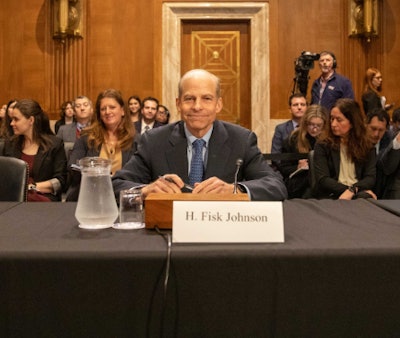The first week of March saw SC Johnson's CEO testify before the U.S. Senate Committee on Environment and Public Works at a hearing about extended producer responsibility (EPR) policies for consumer packaging, along with AMERIPEN (the American Institute for Packaging and the Environment) and WWF (the World Wildlife Fund).
According to the Milwaukee Journal Sentinel, Fisk Johnson, CEO of the chemical cleaning multinational, has advocated for years for federal legislation to better the U.S.'s ability to recycle and reuse plastic, particularly among businesses.
Despite SC Johnson’s companywide commitment to reducing plastic waste through 100% recycled plastic bottles and cleaning solution cartridges that allow bottles to be reused, he admitted during the hearings that he couldn’t say he feels good about the progress being made with plastic waste and recycling. He further advocated for stronger and uniform regulation on plastic and EPR - because "voluntary actions only can go so far."
"In our view, the only practical way to get every stakeholder in the plastic ecosystem working together and driving scale is a government regulatory framework," Johnson told the committee. "All companies of sufficient size in the ecosystem have to be part of it for it to work and to drive the right economics and change."
Erin Simon, the vice president of plastic waste and business for the World Wildlife Fund, and Dan Felton, the executive director of AMERIPEN, a packaging policy advocacy group, also testified before the panel.
“I thought the hearing was an excellent conversation starter with some of the stakeholders, including brands like SC Johnson, who was also present, who will need to be involved in any federal EPR discussions,” Felton told Packaging World. “Questions from committee members were relevant and solicited some good responses from all the witnesses.”
The consensus among those who testified was that steps should be taken to improve, sustain, and upgrade America's recycling system. Johnson was specifically asked about implementing a fee based on a company's "end of life" for plastic products. According to the Milwaukee Journal Sentinel, this would mean that companies producing plastic that ends up in landfills would pay higher fees than companies that have the plastic recycled.
“We will support thoughtful packaging EPR proposals that properly balance the needs of all stakeholders,” Felton testified. “We will not support poorly designed packaging EPR proposals that we believe are not based in reality and will not result in positive environmental change and greater packaging recovery and recycling.”
According to Felton, the fly in the ointment of any legislation is that separate states have enacted their own EPR bills without consistency. This will only decrease the effectiveness of the legislation and ultimately confuse brand owners like SC Johnson. Johnson agreed, using California as an example.
"I'll give you an example: the labeling laws are part of EPR in California, and they will prevent the chasing arrows symbol in most cases. Thirty other states have laws that mandate the chasing arrows," Johnson said, per the Milwaukee Journal Sentinal, referring to recycling symbols on plastic bottles. With products flowing across state lines, the need for a federal policy is obvious but clearly convoluted.
Sen. Shelly More Capito, R-West Virginia, vice chair of the committee, agreed that a program would benefit states but noted that even the smallest recycling bills are snared in Washington’s notorious red tape.
At the end of the day, the hearings highlighted a need for collaboration between the government and the primary stakeholders to come up with a palatable program.
“AMERIPEN looks forward to being closely involved in these discussions moving forward, including with our brand and other members,” Felton said.



























